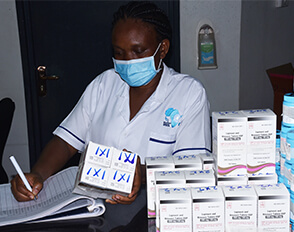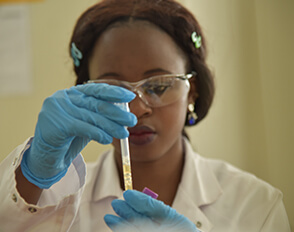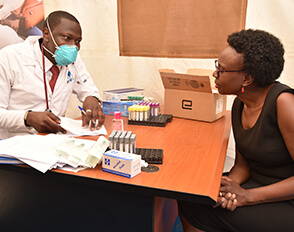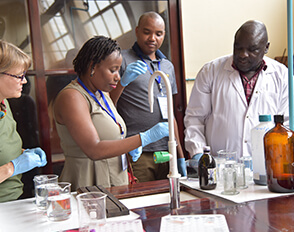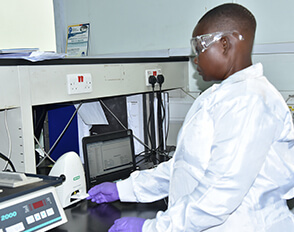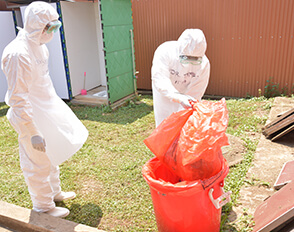
IDI/CDC Alcohol-Based Hand Rub Project Officially Commences Activities in Amuru District
Population Movement Across Border (POPCAB) assessments indicate that border districts in Uganda are at a higher risk of exposure to infectious diseases such as Ebola Virus Disease and COVID-19. In Uganda, majority of the first COVID-19 confirmed cases were truck drivers intercepted at Points of Entry (POEs). As such, health facilities and other community locations along truck routes and border crossings are at risk. Yet a 2019 global baseline UNICEF report indicated that 1 in 4 healthcare facilities lack basic water, 1 in 5 have no sanitation, 42% lack hand hygiene at the point of care, and 40% lack systems to segregate waste.
With funding from the Centers for Disease Control and Prevention (CDC), the IDI/CDC Alcohol-Based Hand Rub (ABHR) Project within the IHR Global Health Security Program (GHSP) began operations in border districts with a goal to increase access to handwashing facilities and ABHR use in health facilities and community locations along truck routes and border crossings.
A prior POPCAB assessment conducted in Amuru district by the project identified 4 health facilities and 22 community locations including checkpoints, locations within the POE, markets, guest houses, and schools as priority locations. These were earmarked to be supported by the project for a year. A baseline assessment was conducted on the identified locations prior to the intervention.
The IDI CDC ABHR project team held a stakeholder meeting with Amuru district leadership and community location leaders to introduce the project activities in the district as well as disseminate findings of the assessments conducted. The intervention package, which includes the provision of ABHR, handwashing stations/refurbishing any existing broken ones, IEC materials as well as onsite infection prevention/hygiene and sanitation training, was discussed followed by a tour of the ABHR production unit already established by IDI at the Amuru District Headquarters in a space provided by the district. For sustainability, IDI will build capacity of four district staff in the production, distribution, and quality control of ABHR.

The district leadership (RDC, CAO, and DHO) signed a Memorandum of Understanding with IDI leadership in commitment to achieving the project goal and objectives in Amuru district. In attendance was a CDC delegation led by the Country Director, Dr. Lisa Nelson, the deputy incident commander of the Ministry of Health, Mr. Atek Kagirita, other partners, and the IDI delegation.
“Today, we hold a historic event in our district. We are very happy and know that this is just the beginning. We have worked with IDI for the first months in surveillance and monitoring. We will be happy if our health workers build capacity so that they can render better services to our people. We shall make sure to work with you to achieve targets so that our people can gain from this project.” – Dr Odong Patrick Olwedo, the District Health Officer.

“CDC expanded its support to the Global Health Security agenda, that is; to prevent, detect and respond. The ABHR project has been going on for a number of years and I have seen activities going on in Kasese district. I am pleased that through IDI, we are able to expand this effort to Amuru District. CDC is interested in promoting sustainable strategies. It is very fortunate that we have been working on better strategies to produce ABHR locally and also have local ownership.” Dr. Lisa Nelson, CDC Country Director
The IDI/CDC ABHR project started as a study in 2018 in Kabarole district “Evaluation of Hand Hygiene Products: Alcohol-based Hand Sanitizer and Handwashing Stations—and associated Compliance in Healthcare Facilities in Uganda“. Health workers in 30 health facilities had access to ABHR from the established production unit. The results indicated improved hand hygiene compliance among health workers especially with the use of ABHR. The project extended to Kasese district during the 2018 Ebola outbreak as part of the IDI CDC support for preparedness and response. In addition to Amuru and Tororo border districts, operations will soon be extended to Moroto, Napak, and Amudat districts as part of the COVID-19 response IPC/WASH activities.
The project focuses on 3 specific objectives and that is;
- To improve access and use of alcohol-based hand-rub in 2 border districts in Uganda (Amuru and Tororo)
- To sustain and evaluate the utilization of Alcohol-Based Hand Rub (ABHR) in 2 districts in Kabarole and Kasese, Western Uganda
- To promote and sustain locally manufactured ABHR use in health facilities in Uganda.
This is a Centers for Disease Prevention and Control (CDC) funded project.
By Nakitandwe Rebecca Melisa

